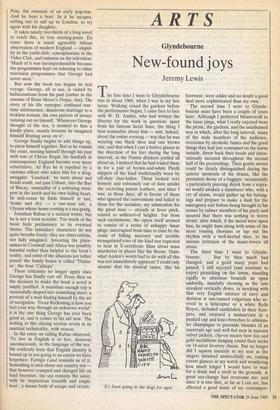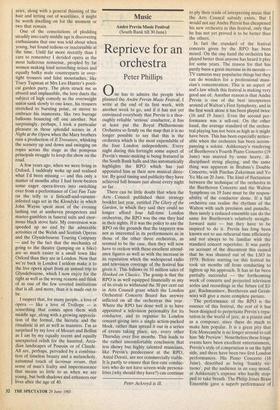ARTS
Glyndebourne
New-found joys
Jeremy Lewis The first time I went to Glyndebourne was in about 1960, when I was in my late teens. Walking round the gardens before the performance began, I came face to face with W. H. Auden, who had written the libretto for the work in question: apart from his famous facial lines, the thing I best remember about him — and, indeed, about the entire evening — was that he was wearing one black shoe and one brown one, and that when I cast a furtive glance in the direction of his feet during the long interval, as the Pimms drinkers jostled all about us, I noticed that he had traded these in for a pair of brown-and-white Pirelli slippers of the kind traditionally worn by off-duty char-ladies. These looked very homely and extremely out of date amidst the encircling patent leathers, and since I was, in those days, all in favour of those who ignored the conventions and failed to dress for the occasion, my admiration for the great man — already at fever pitch, soared to unheard-of heights. Far from such excitements, the opera itself seemed to consist of a series of unhappy lunar pings, interrupted from time to time by the crash of falling masonry and terrible strangulated cries of the kind one expected to hear in X-certificate films about mass murderers in places like the Bronx. Quite what Auden's words had to do with all this was not immediately apparent: I could only assume that his musical tastes, like his 'It's been going to the dogs for ages.' footwear, were odder and no doubt a good deal more sophisticated than my own.
The second time I went to Glynde- bourne must have been a couple of years later. Although I preferred Monteverdi to the lunar pings, what I really enjoyed were the picnic, the gardens, and the unashamed way in which, after the long interval, many of the male members of the audience, overcome by alcoholic fumes and the good things they had just consumed on the lawns outside, threw back their heads and osten- tatiously snoozed throughout the second half of the proceedings. Their gentle snores could be clearly distinguished during the quieter moments of the drama, like the persistent drone of a bagpipe: occasionally a particularly piercing shriek from a sopra- no would awaken a slumberer who, with a cry of alarm, would gather up his belong- ings and prepare to make a dash for the emergency exit before being brought to his senses by calmer members of his party and assured that there was nothing to worry abcrut; after which, if the mood were upon him, he might hum along with some of the more rousing choruses or tap out the rhythm with a well-heeled shoe, to the intense irritation of the music-lovers all about.
The third time I went to Glynde- bourne. . . But by then much had changed, and a good many years had passed. I still enjoyed (and continue to enjoy) picnicking on the lawns, standing rigidly to attention beneath an open umbrella, manfully chewing as the rain streaked vertically down, or mocking with that very English mixture of envy and derision at sun-tanned vulgarians who ar- rived in a helicopter or a white Rolls Royce, included candelabra in their ham- pers, and retained a manservant in a peaked cap and knee-breeches to adminis- ter champagne to peroxide blondes of an uncertain age and well-fed men in maroon velvet jackets, clip-on mauve bow ties and gold medallions hanging round their necks on 14-carat lavatory chains. But no longer did I squirm uneasily in my seat as the singers shrieked unmercifully on, casting covert glances at my watch and wondering how much longer I would have to wait for a drink and a stroll in the grounds. A great sea-change had overcome me: and since it is one that, as far as I can see, has affected a good many of my contempor-
aries, along with a general thinning of the hair and letting out of waistlines, it might be worth dwelling on for the moment or two that remain.
One of the consolations of plodding steadily into early middle age is discovering enthusiasms that one was told about when young, but found tedious or inaccessible at the time. Until far more recently than I care to remember I derided opera as the most ludicrous nonsense, peopled by fat women making loud screeching noises and equally bulky male counterparts in over- tight trousers and false moustaches, like Tracy Tupman at Mrs Leo Hunter's poeti- cal garden party. The plots struck me as absurd and implausible, the love duets the subject of high comedy as the overweight suitor sank slowly to one knee, his trousers stretched to bursting point, or strove to embrace his inamorata, like two barrage balloons bouncing off one another. Not surprisingly, perhaps, I took a particular pleasure in those splendid scenes in A Night at the Opera when the Marx brothers ruin a production of 11 Trovatore, whisking the scenery up and down and swinging on ropes across the stage as the pompous principals struggle to keep the show on the road.
A few years ago, when we were living in Oxford, I suddenly woke up and realised what I'd been missing — and this only a matter of months after I had brow-beaten some eager opera-lovers into switching over from a performance of Cosi Fan Tutte on the telly to a fisticuff-and-varmint- infested saga set in the Klondyke in which John Wayne spent most of the evening lashing out at unshaven prospectors and master-gamblers in funeral suits and enor- mous black stove hats. My conversion was speeded up no end by the admirable activities of the Welsh and Scottish Operas and the Glyndebourne Touring Company — and by the fact that the mechanics of going to the theatre (jumping on a bike) are so much easier in a small town like Oxford than they are in London. Now that we're back in London I seldom make it to the live opera apart from an annual trip to Glyndebourne, which I now enjoy for the right as well as the wrong reasons and think of as one of the few coveted institutions that is all, and more, than it is made out to be.
I suspect that, for many people, a love of opera — like a love of Trollope — is something that comes upon them with middle age, along with a growing apprecia- tion of the formal, the hieratic and the ritualistic in art as well as manners. I'm as surprised by my love of Mozart and Bellini as I am by my equally recent and equally unexpected relish for the haunted, Arca- dian landscapes of Poussin or of Claude. All are, perhaps, pervaded by a combina- tion of timeless beauty and a melancholy,
autumnal touch of lacrimae rerum, that sense of man's frailty and impermanence
that means so little to us when we are young, but both shadows and enhances our lives after the age of 40.



























































 Previous page
Previous page